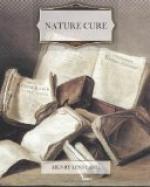The Master, Jesus, emphasized this law of use in many of his parables and sayings.
“For whosoever hath, to him shall be given, and he shall have more abundance: but whosoever hath not, from him shall be taken away even that he hath.”
What does this mean? Those who have the desire and the will to work out their own salvation, acquire greater knowledge and power in exact proportion to their well-directed efforts; but those who have neither the desire nor the will to help themselves, lose their natural endowments and the possibilities and opportunities which these would have conferred upon them.
The anatomy and physiology of the human brain reveal the fact that for every voluntary faculty, capacity, and power of body, mind, and soul which we wish to develop, we have to create new cells and centers in the brain. In this respect, Nature gives us no more and no less than we deserve and work for. If we “try to cheat” by usurping the perfection and the power which we have not honestly earned and developed, then sometime, somewhere we shall have to “square the balance.”
The Right Way to Pray
After all, the only true prayer is personal effort and self-help. This does not mean that we should not invoke the help of the Higher Powers, of those who have gone before us, of the Great Friends and Invisible Helpers, and of the Great Father, the giver of all life, all wisdom, and all power. But we should pray for strength to do our work, not to have it done for us. The wise parent will not do for the child the home tasks assigned him at school. Neither will the powers on high or the Great Friends perform our allotted tasks for us.
This life is a school for personal effort. If it were not so, life would be meaningless. From the cradle to the grave, our days are one continuous effort to learn, to acquire, to overcome difficulties. Only in this way can we develop our latent faculties, capacities, and powers. These cannot be developed by having our tasks done for us, nor by assuming that we already know and possess everything.
The athlete must do his own training. No one else can do it for him. The assumption of superiority over his opponent will riot develop his suppleness of body and strength of muscle. To be sure, faith and courage are essential to—victory, but they must be backed by careful and persistent training. Vainglorious boasting alone will not win the contest.
So in the battle of life, the more faith we have in God, in the Great Friends, and in our own powers, the wider do we open ourselves to the inflow of wisdom and strength from all that is good and true and powerful in the universe. But through persistent and welldirected effort alone can we control the powers and fashion the materials which Nature has so lavishly bestowed upon us.
The creative will, actuated by desire and enlightened by reason, brings order and harmony out of chaotic forces and materials. And yet certain metaphysicians tell us that we ourselves must do nothing to overcome weakness, sin, and suffering, that we must depend entirely upon the efficiency of metaphysical formulas, that the deity and the powers of Nature are jealous of our personal efforts, that we must not try to help ourselves lest we forfeit their good will.




